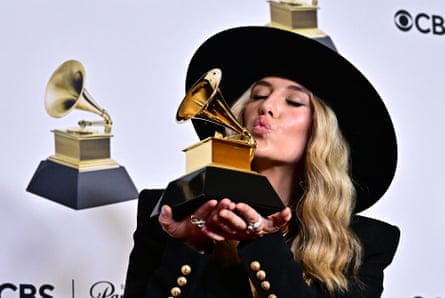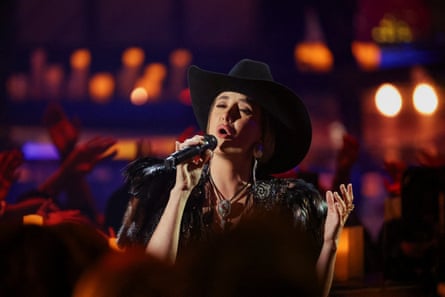You get the sense the country music establishment really had no choice but to embrace Lainey Wilson: that she wasn’t going anywhere until they did. When the singer-songwriter arrived in Nashville in 2011, she parked her 20-foot bumper pull trailer on a studio’s lawn and anchored it with rocks. Then 19, she had lived country music all her life. But Nashville is what they call a “10-year town”, rarely a place of instant hits and TikTok fame. Wilson had to do it the old-fashioned way: a decade of graft, rejection, false starts, handing out CDs in the streets, gigs, tours and playing to the same crowds over and over.
Gradually, things started to click (a publishing deal in 2017), then gather momentum (six No 1s on country radio since 2021), then snowball (a record-breaking nine nominations at the 2023 CMA awards, winning five), culminating in February when her 2022 album, Bell Bottom Country, won this year’s Grammy for country album of the year. Wilson is now one of the hottest properties in country music. An overnight sensation 11 years in the making, as she puts it. “It feels great,” says Wilson, 31, over video call, with her irresistible Louisiana twang, “because it makes me feel like maybe I wasn’t as crazy as a lot of people thought I was. Like, I told ya!”
Wilson’s music is rooted in traditional country, but draws heavily from a more mainstream Nashville sound, plus southern rock and pop. There’s also a big Dolly Parton influence – her song WWDD wonders What Would Dolly Do whenever life gets tough. Drawn to the genre’s strong tradition of storytelling, she favours poetic, introspective ballads about typical country staples of hard truths and heartbreak. But for all the tough earnestness she’s got a playful swagger, too, and not just in a clutch of catchy anthems – when we talk, Wilson has just returned to Nashville from touring Australia, where she surprised fans by chugging beer from a boot.
“I never thought somebody on literally the other side of the world would ever be able to relate to my story,” she says, lying on a lounger on her lawn, mildly distracted by her french bulldog Hippy Mae (an Instagram star in her own right). A feathered cowboy hat shields her from the Tennessee sun. “But it just goes to show you that we’re all a lot more alike than you think and that’s really beautiful.”
The Europe leg of her international tour reaches the UK this week. “I don’t know any other way than hardcore touring,” she says. “I’ve basically been touring for the past 15 years. Even longer than that if you want to add in eighth grade [when] I started impersonating Hannah Montana. That was my job; I did three or four parties a weekend, and I would open up for myself.”
Her ascension comes at a time when country music is surging and broadening in popularity. We speak the day that Beyoncé released Cowboy Carter, while Lana Del Rey has promised a country album for later in the year, and in the UK it is strengthening its embrace – country (or country-ish) songs by Beyoncé, Dasha and Noah Kahan are all currently in the UK Top 10, and Chris Stapleton is selling out arenas for his autumn tour. Wilson acknowledged the genre’s buoyancy with recent single Country’s Cool Again. “I’m very proud to be a part of that moment,” says Wilson. “I truly think it has to do with folks wanting to feel warm and embraced. And I think country music can do that.” She thinks there are many reasons for the renaissance, notably: the fashion returning (cowboy hats, denim, Wilson’s signature bell-bottom jeans), the immensely popular TV show Yellowstone (Wilson had an acting role in the show’s fifth season last year), and, of course, pop artists “going country”.
Does it matter if you don’t have traditional country roots? “There’s no doubt that I’m southern, I’m country, I’m a redneck, I’m whatever you want to call it,” she says. “But I think it goes a lot deeper than that, ya know?”

Wilson was born in 1992 and raised in Baskin, Louisiana – a small town with a population in the hundreds. Her father is a farmer (“corn, wheat, soybeans, oats”) and her mother a teacher. Wilson was a very “emotional kid” and when she wasn’t helping out on the farm she was writing music. At nine, she wrote her first song and got her first paid gig: a family friend paid her $20 to sing a capella at the grand opening of his nearby convenience store. Her dad still has the $20 bill.
After that she dreamed only of Nashville. “And for some crazy reason my parents were like: ‘OK, we’ll help you do whatever you need to do.’ They had a weird sense of peace about it.”
That family friend, Jerry Cupit, was also a songwriter and producer who moved to Nashville and set up a studio with financial help from Wilson’s grandfather. When Wilson was ready to move there, he let her park her trailer on his studio lawn, 10 miles out of town. More importantly, he became her mentor. “He didn’t ask me to pay a dime because of what my grandfather had done for him generations before,” says Wilson. “I was bumming water and wi-fi and electricity.”
It wasn’t without its dangers though. “My TV wouldn’t work at times. And so I never really knew what weather was coming in. All of a sudden my camper trailer would start to rock back and forth. And then tornado sirens were going off. It was scary.”
Nashville was not what she expected. “I was so overwhelmed,” she says, “A fish out of water.”
Then Cupit died. “I had to start over. I wasn’t old enough to go to the bars, and those were the places that you could go to meet people in the industry. So I started just knocking on doors and handing them my CD. I didn’t know what else to do.”

Her eventual breakthrough with that publishing deal came as a result of her finally finding the right collaborators. “For a long time I was running into folks [who were] thinking that maybe if I was just a little bit different than who I am, that would work. I just have a hard time being anything other than myself,” she says.
But part of the delay Wilson experienced is arguably down to the country music establishment’s attitude towards female artists: occasional breakout stars such as Kacey Musgraves, Carrie Underwood and of course Taylor Swift are relatively rare between the men singing about women, trucks and beer. It is, she says, “100%” harder for female country artists to break through. “But the way that I was raised, I keep my head down. It’s a hard pill to swallow. But I’m gonna outwork everybody, I’m gonna roll my sleeves up and damn it, I’m gonna figure out how to do it.
“It’s a boys’ club, but I tell all of my guy artist friends all the time: us girls are coming for ya so you better watch out.”
As for her take on the widening schisms in the genre – “The Culture Wars Are Tearing the Close-Knit Country Music Community Apart” ran a Rolling Stone headline last year – Wilson laments: “I hate that that is happening in country music. I’ve got friends on both sides of the fence. I just see people for people, and you just choose to love them and you know, the way that God loves you. But if you believe something with all your heart, and you want to stand up for it, I’m good with that, too.”
Wilson returns again to the idea that country music is open to all. “If you don’t step outside of the bubble then you’re not going to learn a lot about different types of people,” she says. “And the truth is, we all put our pants on the same way, one leg at a time, and we all bleed red. It just takes so many different kinds of people to make the world go round.”
Source: theguardian.com


